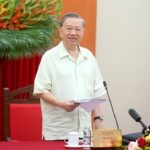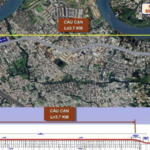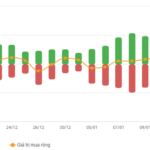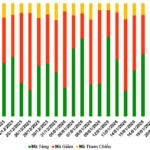On the morning of October 15th, the First Congress of the Ho Chi Minh City Party Committee for the 2025-2030 term entered its final day of proceedings.
Kicking off the day, delegates listened to a presentation by Lam Dinh Thang, Director of the Ho Chi Minh City Department of Science and Technology, on the development of science, technology, innovation, and digital transformation (ST&I, DT) – a strategic breakthrough for the city in the new era, in line with Resolution 57.
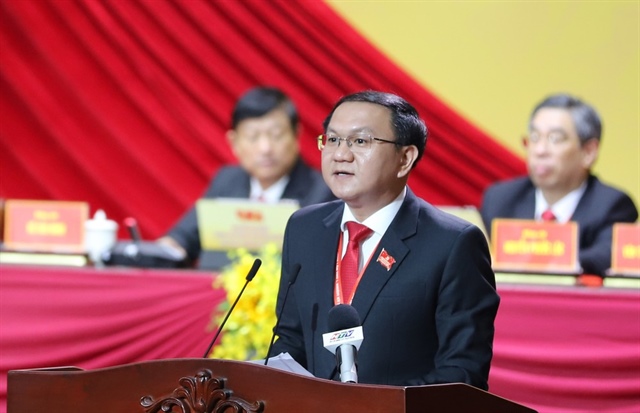 Lam Dinh Thang, Director of the Ho Chi Minh City Department of Science and Technology, delivers his presentation at the Congress. Photo: Organizing Committee |
Ho Chi Minh City Ranks 30th Globally in Blockchain
According to Lam Dinh Thang, over the past period, ST&I has proven to be a crucial driver of the city’s growth. Total Factor Productivity (TFP) underscores the contribution of science and technology to the city’s growth, projected to reach 59% by the end of 2025 and expected to remain a key driver over the next five years.
The digital economy has grown robustly, contributing 22% to the city’s GRDP in 2024, with projections to rise to 25% in 2025.
Thang also highlighted that the city currently ranks second in the National Digital Transformation Index and the National Innovation Index. Its startup ecosystem is ranked 110th globally and 5th in Southeast Asia. Additionally, the city has climbed to 30th in the world for blockchain technology.
To achieve these results, Thang emphasized that the city has consistently implemented synchronized key solutions, establishing unique policies to attract talent and investment.
Specifically, non-refundable financial support for innovation, wage incentives, and the establishment of internationally accredited research centers have been introduced.
The city government has streamlined administrative procedures and attracted investment by reducing nearly 300 business-related procedures, equivalent to over 1,900 working days. Dedicated task forces have been set up to provide timely support to strategic investors.
“Thanks to these efforts, in the first six months of 2025, the science and technology sector attracted $1.6 billion in FDI, accounting for 40% of total investment. Currently, the city is home to over 140 science and technology enterprises, ranking second nationally,” said the Director of the Department of Science and Technology.
Furthermore, the city has continuously invested in digital infrastructure, maintaining its lead in national rankings for digital transformation and innovation. This has attracted numerous large and super-large data centers.
“The city government is transitioning to data-driven governance through various digital platforms,” Thang noted, highlighting sectors like healthcare, education, and transportation that have adopted digital transformation and AI applications. Cybersecurity has also been prioritized with a four-layer protection model and regular drills.
The city focuses on in-depth and broad-based workforce training, boasting nearly 100 high-quality training institutions. Leading global tech firms like SAP, Marvell, and Qualcomm have established offices and R&D centers here. The city also hosts over 55% of the country’s programmers.
“Since the beginning of 2025, over 40,000 officials, civil servants, and hundreds of outstanding students have received AI training,” Thang emphasized.
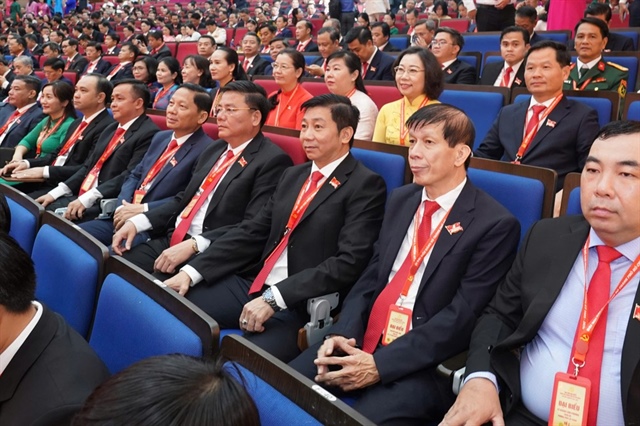 Delegates attend the First Congress of the Ho Chi Minh City Party Committee for the 2025-2030 term on the morning of October 15th. Photo: Organizing Committee |
Three Strategic Breakthroughs
Based on these achievements, the Director of the Department of Science and Technology outlined key goals for the next five years. The city aims for TFP to contribute at least 60% and the digital economy to account for 30-40% of GRDP.
“The city aspires to become an International Innovation Hub by 2030,” he stated, noting this is a task assigned by the Central Steering Committee for Resolution 57. Additionally, the city aims to place its startup ecosystem among the top 100 globally and establish at least five internationally accredited research centers in strategic technology fields.
To achieve these goals, Ho Chi Minh City will focus on three strategic breakthroughs.
The first breakthrough is in mechanisms, policies, and investment attraction. The city will target strategic investors in science and technology. “Currently, the UAE’s G42 Group plans to invest nearly $2 billion in a super AI data center in the city,” he shared.
The city will develop high-tech zones and pilot areas for new technologies under special mechanisms. It will also pilot a public-public partnership model to invest city funds in local universities, aiming to place Ho Chi Minh City National University in the top 100 in Asia by 2030. Policies will encourage private sector investment in science and technology.
The city will also develop the Information Technology Park and support SMEs in digital transformation.
The second breakthrough focuses on strategic technologies and the innovation ecosystem. The city will prioritize technologies like AI, cloud computing, semiconductors, robotics, blockchain, and bio-medicine. A new startup support fund will be established, attracting venture capital, with a focus on nurturing high-potential innovation centers.
In collaboration with Ho Chi Minh City National University, the city aims to become an international innovation hub. “Initially, development will focus on four areas: within the National University and connected institutions; export processing zones, industrial parks, and high-tech zones; state-invested entities; and public-private partnerships,” Lam Dinh Thang explained.
The third breakthrough is in digital governance and digital workforce development. The city will accelerate the construction of digital data and platforms to enhance data-driven governance. It will strengthen collaboration among schools, government, businesses, and investment funds, alongside technology diplomacy and international expert recruitment.
Particularly, the city will intensify digital workforce development to maintain its leading position. Comprehensive infrastructure will be provided to local units.
“With political determination, business collaboration, and public participation, Ho Chi Minh City will successfully implement these breakthroughs, becoming a regional and international hub for science, technology, and innovation,” Thang expressed confidently.
|
Lack of Testing Spaces for New Technologies Ho Chi Minh City faces significant challenges in developing science, technology, innovation, and digital transformation. These include inflexible science and technology management mechanisms, a lack of testing spaces for new technologies, and incomplete data infrastructure for comprehensive digital transformation, requiring central government support. The “three-party” linkage model remains underdeveloped, and total social investment in R&D is still low. Mr. LAM DINH THANG, Director of the Ho Chi Minh City Department of Science and Technology |
THANH TUYỀN
– 09:28 15/10/2025
Mail Fraud Alert: Victims Express Outrage Over Recent Postal Scams
Many individuals have expressed frustration over receiving scam calls from fraudsters immediately after sending mail via postal services.
EXIMBANK Shines with Two Prestigious Awards at APEA 2025
On October 9, 2025, Eximbank was honored at the Asia Pacific Enterprise Awards (APEA) 2025 with two prestigious accolades: the Corporate Excellence Award and the Fast Enterprise Award.

